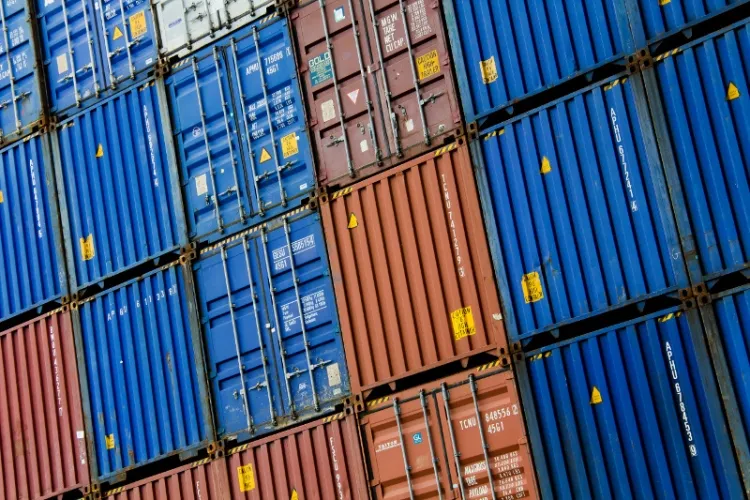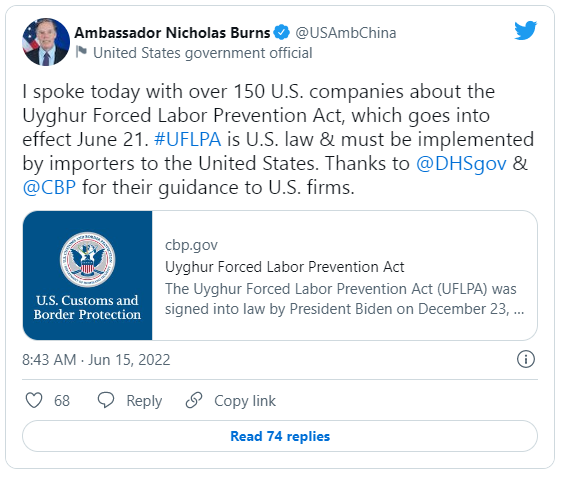Uyghur Forced Labor Prevention Act enters into force in the United States
- The US' Uyghur Forced Labor Prevention Act (UFLPA) has entered into pressure today as well as thinks that any type of things "completely or partially" made in China's Xinjiang region are a product of the area's affirmed labour camps for ethnic minorities, meaning they are banned from going into the US.

The law, which has potentially big implications for the US solar sector, is an action to accusations that China is maltreating Uyghurs and other ethnic minorities in the north-western area of Xinjiang, where close to half of the globe's polysilicon is created.
On Friday (17 June), the US Department of Homeland Security launched a listing of entities whose products are thought to be made with forced labour and are banned from going into the United States.
The checklist includes loads of business who are charged of using forced labour or promoting it and the transfer of people to alleged labour camps in China, including Hoshine Silicon as well as the Xinjiang subsidiaries of polysilicon makers Daqo, East Hope as well as GCL.
The essential concern for the US solar sector, and undoubtedly companies in other areas that export to the US, is exactly how purely the law will certainly be enforced and the standard of evidence called for to pass US Traditions and also Border Protection (CBP) checks, with an "elevated" criterion compared to the existing Hoshine Withhold Release Order (WRO) expected.
On 13 June, CBP provided advice to importers relating to the criterion of proof needed, mentioning the Act requires CBP to "apply the rebuttable presumption unless the importer can overcome the presumption of forced labour by establishing, by clear and convincing evidence, that the good, ware, write-up, or merchandise was not extracted, produced, or manufactured wholly or in part forcibly labour."
" This elevated criterion will require the importer to not only use due diligence in examination of its supply chain, but also to respond totally and also substantively to CBP requests for details regarding entries it may review," the CBP added.
The United States ambassador to China, Nicholas Burns, stated he had actually spoken to more than 150 United States companies, advising them to strive to adhere to the UFLPA as well as thanking CBP for its assistance on the issue.

Christian Roselund, elderly policy expert at supply chain traceability firm Clean Energy Associates (CEA) said: "This was the outcome that we discovered most likely as well as indicates a de facto restriction on cells and also modules consisting of polysilicon from Xinjiang."
Roselund said most big distributors serving the US were already making use of ex-Xinjiang polysilicon and that there was "adequate polysilicon for the United States and also EU markets from various other provinces in China", including that more non-Xinjiang polysilicon capacity was anticipated to find online in various other provinces in 2023.
Likewise, BNEF stated that "most solar wafer manufacturers have currently separated supply chains for the United States as well as non United States markets, and also there is a lot of polysilicon made outside Xinjiang to supply the United States market," according to its head of solar analysis, Jenny Chase, that added that BNEF anticipates the effect of the ULFPA to be "very restricted" unless "proof of origin proves harder than anticipated on implementation".
A "great worry" for the US market, however, is the 13 June CBP advice that might see the enforcement agency concentrate on manufacturing facilities with numerous sources of supply, said Roselund, with the CBP progressively warm on the co-mingling on items from various resources.
"Module customers can see obstacles sourcing modules not only from China as well as Southeast Asia yet almost all nations. China generates 97% of the world's ingots as well as wafers and there are few ingot and also wafer manufacturing facilities that currently process just non-Xinjiang polysilicon," stated Roseland, adding that CEA saw the capacity for new US-serving ingot as well as wafer manufacturing facilities in Southeast Asia to process just non-Xinjiang polysilicon to adhere to the new support.
Also read
- Syria Fast-Tracks Small Renewables, Greenlights Two New 100-MW Solar Projects
- BNDES Admits Arctech to FINAME, Boosting Solar Trackers Across Brazil
- TCL Solar Secures 250 MW Pakistan Distribution Deals to Accelerate Growth
- Astronergy Invests $53M in Tandem Solar Cell Project
- ARENA Unveils $39M Solar Innovation Funding Round
